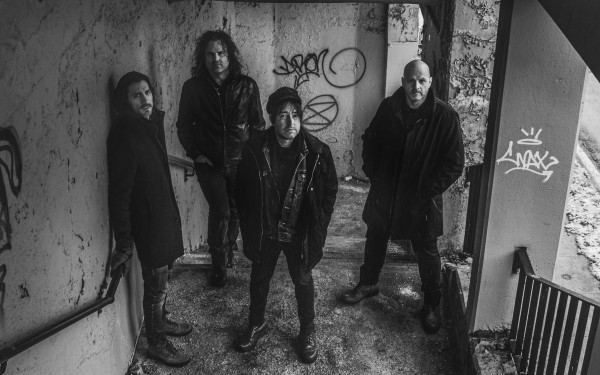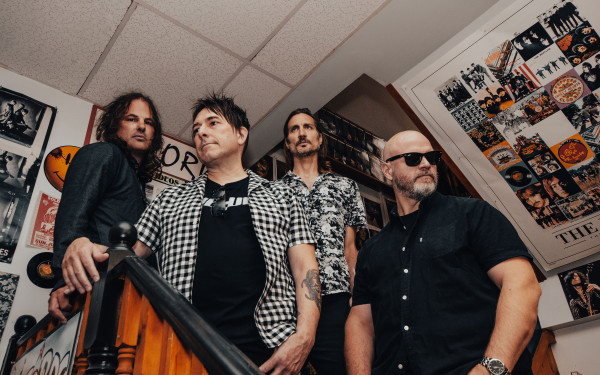A One on One with Martin Saint
Montreal Rocker Talks New LP and Music as Spiritual Pursuit
Martin Saint is not an idle man. Fresh off the release of Where Spirits Play—the latest EP from Montreal post-punks The Ember Glows—the vocalist and multi-instrumentalist is finalizing a solo album set to launch in January. Titled Radio Murmurs, the LP will break life down into vignettes and dwell on the passage of time.
Included on the track list is Saint’s cover of Leonard Cohen’s deep cut “The Law.” Shrouded in smoke, Saint’s baritone vocals melt over a persistent groove punctuated by eerie bells and ephemeral synths. One can imagine this version accompanying them while creeping up the stairs of a haunted castle by torchlight.
Saint, a born-and-raised Montrealer, is undertaking several projects at once. A self-described “lounge crooner,” the musician continues to lend his voice to The Ember Glows in addition to collaborating on tracks with singer/songwriter Ursa Minor. Saint also just wrapped up the first public display of his landscape illustrations at Le Boudoir Montréal and is hoping to publish a “dream pet project”—an illustrated volume of his lyrics.
The Link sat down with Saint to discuss poetry, David Bowie and music as a spiritual pursuit.
Answers have been edited for clarity.
Q: What is your writing process like?
A: I try to write every single day. I’m old fashioned and still write long hand, so I have tons of notebooks everywhere in my place. If I’m getting coffee with somebody and I arrive early, I’ll take those five minutes to write. Even later tonight, this is what I’m going to do. I like to spend all-nighters writing till the wee-hours.
Q: How do you approach songwriting as a solo artist versus when you’re part of a group?
A: Being in a band, there’s always compromises that need to be made. We’re four individuals; we all have different views. There’s always a bit of negotiation involved which is fun—it’s why you’re in a band. But there [are] things I wanna do just for myself that I don’t feel like imposing on them. That’s the nature of being solo. If I write something for myself, I have a bit more freedom because I only have myself to please.
Q: Was there a particular vision you were aiming for with Radio Murmurs?
A: It's important to have a certain unity of sound, of mood and of whatever signature I possess. I want to write songs that have a good mixture of atmosphere and hooks. Something that Bowie might have done during his Berlin period, where half the album is traditional catchy pop songs, while the others are more out there, more instrumental.
Q: How does your approach to writing poetry differ from your songwriting?
A: They're two different art forms. You can have a really good poem, but it's not necessarily musical. You can have some very interesting words in prose or poetry that are evocative and beautiful, but don’t translate or roll off the tongue—they don't sound good, basically, when sung. In both cases, I'm always striving to say more with less [words]. I try not to tell you, but to show you. Can I give you an image that you're going to read and say “yes, I remember this happened to me” or “I can imagine this happened” because it's very visceral, very clear.
Q: What is your approach to covering songs, especially in regards to “The Law” ?
A: It has to be a song I wish I had written, that I have utmost admiration for. And I need to feel that I can bring something personal or that I can rearrange it in my own way and still make it interesting. You know, appropriate it for three, four minutes. When I first started doing solo gigs, half my sets would be covers, and I didn't pick easy ones. I picked covers that nobody else did but that fit with the sound of my original stuff. So, the biggest compliment that I would ever get was when people didn't know which was a cover and which was mine.
Q: How has your approach to songwriting evolved over time?
A: The idea is not to cram the space and just ram fancy words down people's throats, it's just to trigger an emotion. I'm less and less afraid of being vulnerable now. When I started writing songs, I was trying to cloak myself a little by writing like that. And now, [...] the songs are more raw. That really came down to studying songcraft. I was looking at songs I wanted to emulate, that I wish I’d written, and then I was looking at what I was doing and realized “This is boring. This doesn't mean anything.” That's when I gradually realized that I wanted to take a path with less resistance.
Q: How does the past influence your lyrics?
A: In a lot of what I write, I'm very aware of the passing of time. On the new album, there's a song called “No hard Feelings,” and it's about how time goes by and how sometimes you're doing something for the last time, but you don't know that it’s the last time yet. You find this out later that this cycle in your life, this particular life is over, and you’re in another one now. It's like when you run into an old friend, but you've evolved differently. And you realize you like the person, you have nothing against them, but you're somewhere else now. And you can try to recreate that magic, but it's not there anymore.
Q: Do you see music as a spiritual pursuit?
A: Oh, yeah, I'm not ashamed to say it. It turns out that the great majority of the music that I always go back to has some spiritual feeling to it. Whether it's Leonard Cohen or Bowie—or even Elvis or old gospel stuff. It isn’t preachy or religious in that sense, there’s more of an element of searching for your soul.
Much of Martin Saint’s work—including his cover of “The Law”—can be streamed on bandcamp.
This article originally appeared in Volume 43, Issue 8, published December 6, 2022.







